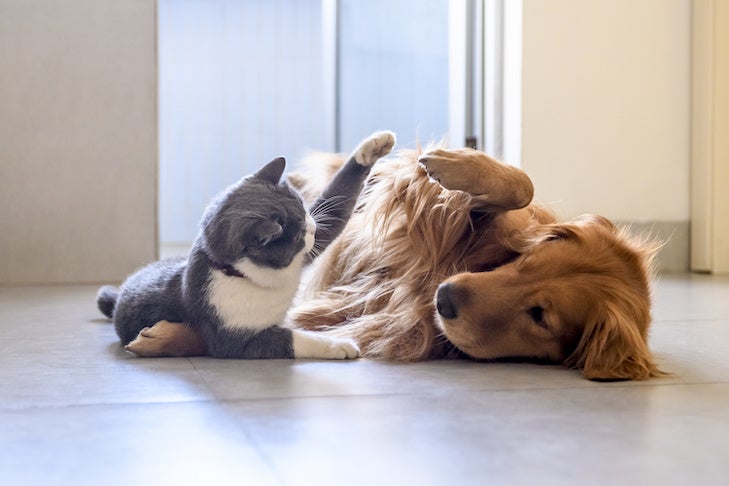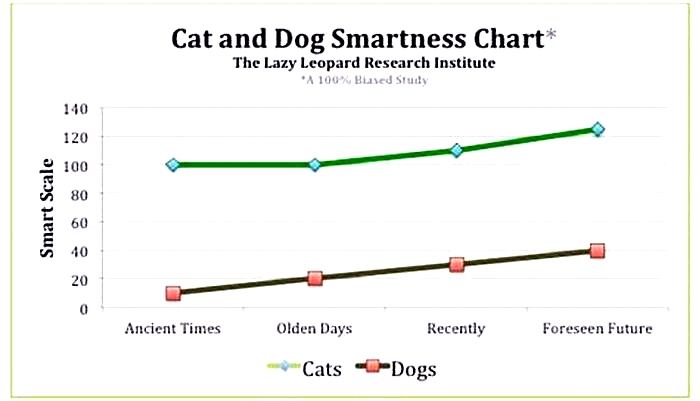Are Labradors smarter than cats

Are Dogs Really Smarter Than Cats?
Dog people and cat people have an age-old debate about which animal makes a better pet. Dog owners brag about canine intelligence, and cat lovers reply that cats are as just smart as dogs, they simply cant be bothered to obey. Well, new research published in the journal Frontiers in Neuroanatomy seems to support the argument that dogs might actually be smarter than cats.
Debora Jardim-Messeder and her colleagues looked at the brains of animals in the order Carnivora, a group of mammals that contains bears, seals, and raccoons, as well as our domesticated cats and dogs. The purpose of the study was to explore the link between brain size and the number of neurons (specialized cells that transmit information) in the brain. If brain size is equal in different animals, the higher the number of neurons, the more densely packed those neurons are.
The researchers were particularly interested in the cerebral cortex the part of the brain linked with intelligence because it controls complex thought processes such as decision-making and planning. The more densely packed the neurons are in a species cerebral cortex, the more intelligent that species is considered to be. For example, primates, renowned for their smarts, have brains with very dense neurons.
Eight species of Carnivora were included in the study, with one or two sample animals from each species. The one domestic cat and the two dogs (one Golden Retriever and one dog of unspecified breed) used by the researchers died of natural causes, and their bodies were donated to science. Images were made of the structure of each animals brain, and the brains weight was measured for purposes of size comparison. Then, to determine the exact number of neurons, each brain was dissolved, and the number of cells in a sample of the resulting liquid was counted under a microscope. This sample count was used to estimate the number of cells in the complete brain.


Not Just a Case of Bigger Brains
Results showed that the dogs, having larger brains to begin with, had more than twice as many neurons in their cerebral cortex as the domestic cat, with around 530 million cortical neurons to the cats 250 million. (For comparison, there are billions of neurons in the human brain.) Because the brain relies on neurons to process information, the more neurons an animal has in its cerebral cortex, the more information it can process, and the richer its mental capabilities likely are. This means that dogs have the potential for more complex and flexible behavior than cats.
But it wasnt simply a case of the dog having a bigger brain than the cat. The Golden Retrievers brain, in particular, had even more cortical neurons than the African lion and brown bear also included in the study, even though the lion and bear had far larger cerebral cortices than the dog. In other words, the dog packed more neurons into a smaller space. It seems that thousands of years of living domestically with humans hasnt hurt our canine companions intelligence.
Before dog people start saying, I told you so, to their cat-loving friends, its important to keep in mind that the researchers looked at a very small sample size. There was only one cat and two dogs in the study. However, its almost certain that the trend would stay the same, even with more animals included. The neuron counts were too far apart to simply be a case of individual variation.
More importantly, the scientists didnt test the intelligence of living dogs and cats with animal IQ tests or even observe the animals behavior. The results are based on brain cells alone. So, although dogs have greater potential than cats, we have no proof they are using their brains full capabilities. In truth, there is no better animal at being a cat than a cat, and nothing can be a dog quite as well as a dog. And as for which one makes the better pet? It all depends on who you ask.
Poodle vs Labrador: Detailed Comparison Of These Dog Breeds
Poodles are known for their curly, hypoallergenic coat, while Labradors are for their short, thick, water-resistant coat. Today, well compare these two dog breeds: poodle vs labrador.
A poodle is more intelligent and trainable than a Labrador Retriever, making it a great service dog. Labs make great family pets. Poodles come in various sizes, including toy, miniature, and standard, while Labradors are a medium to large-sized breed.

Physical Characteristics And Personality Traits
Poodles are small and have more reserved personalities, while the Labrador Retriever is larger and outgoing.
Labrador and standard poodle size comparison
Here is a side-by-side comparison of their physical attributes:
| Characteristic | Poodle | Labrador Retriever |
| Size | Toy, Miniature, and Standard varieties available, ranging from 6-70 pounds | Generally larger than Poodles, with males weighing 65-80 pounds and females weighing 55-70 pounds |
| Height | Toy: 10 inches or under, Miniature: 11-15 inches, Standard: over 15 inches up to 22 inches | Males: 22.5-24.5 inches, Females: 21.5-23.5 inches |
| Build | Elegant, slender, and refined | Muscular, sturdy, and athletic |
| Coat Type | Curly and profuse (hypoallergenic) | Short and dense |
| Coat Color | Solid colors, including white, black, apricot, silver, and more | Black, yellow, or chocolate |
| Eyes | Almond-shaped and dark | Medium-sized and expressive, ranging from brown to hazel |
| Tail | Straight and set high | Thick at the base, gradually tapering towards the tip |
Coat Type And Grooming
One of the key differences between Poodles and Labradors is their coat types. It directly affects their grooming requirements.
| Breed | Coat Type | Grooming Requirements |
| Poodle | Curly and profuse coat | Frequent grooming visits are necessary to maintain the Poodles coat, as it is prone to matting and tangling. |
| Labrador Retriever | Short and dense coat | Labradors require moderate grooming to keep their coat healthy and minimize shedding. Their shorter coat may be easier for some pet owners to maintain. |
Temperament And Energy Level
Poodles are known for their intelligence, confidence, and alertness. They are reserved with strangers but affectionate with their families. They make awesome companion dogs.
Labrador Retrievers are friendly dogs. They are energetic, playful, and loyal companions requiring adequate exercise. Labrador Retrievers require more physical activity due to their high energy levels.
Exercise And Lifestyle Needs
Poodle Temperament: Need For Mental Stimulation
Poodles are known for being highly intelligent dogs that thrive on mental stimulation. They require regular exercise to keep their minds engaged. Poodles can develop destructive behaviors like chewing furniture or digging holes if bored.
Pet parents should consider interactive toys, puzzle games, and agility exercises to provide adequate mental stimulation. All Poodle varieties need mental engagement Standard, Miniature, or Toy Poodle.
Labradors Need For Physical Activity
Labrador Retrievers are a highly active breed. Provide them with vigorous playtime, running, and other activities. Labrador Retrievers are ideal for pet owners who enjoy outdoor adventures like hiking or long walks.
These dogs can quickly become frustrated and suffer from separation anxiety without adequate exercise. Whether playing Frisbee at the park or hiking in nature, keep your canine companion engaged and entertained!
Trainability
Poodles High Trainability
The Poodle is highly trainable and one of the smartest dog breeds. They are very receptive to training as quick learners excelling at obedience training.
Due to their trainability, Poodles make excellent therapy and service dogs. Poodle owners describe their pets as highly responsive during training sessions.
Whether basic commands or advanced tricks, Poodles pick up new skills quickly. They respond well to positive reinforcement.
Labradors Intelligence And Ease Of Training
Due to their high intelligence, training a labrador is one of the easiest. They have exceptional learning abilities.
This intelligence makes a labrador retriever well-suited for a service dog role and therapy dog. They also perform well in canine sports like flyball, agility, and dock diving.
Their nature also extends to their behavior around children, making them ideal family pets. However, proper socialization is essential to ensure a friendly temperament.
Health Problems
Both poodles and labs are prone to specific health issues. However, a labrador retriever is more prone to genetic issues than a poodle.
Poodle Health Problems
Pet parents, free from genetic issues, will produce healthy pups. Ensure your breeder screens your pup or its parents to reduce the risk. The below tests are crucial for poodles.
- Hip Dysplasia
- Arthritis
- Eye Examination
- Patellar Luxation
- Progressive Retinal Atrophy
- Optic nerve hypoplasia
- Von Willebrands disease
Labrador Health Problems
To reduce the chances of producing genetically defective puppies, ensure your labrador retriever undergoes these tests.
- Eye Examination
- Elbow Dysplasia
- Hip Dysplasia
- Exercise Induced Collapse
- D Locus DNA Test
- Cardiac Evaluation
Similarities Between Labrador Retriever and Standard Poodle
- Both Labrador retriever breed and poodle belong to the purebred category.
- Both breeds reflect high intelligence due to their hunting and retrieving habits.
- These popular breeds need regular exercise to burn excess energy.
- Labrador retriever and poodle temperament can be described as friendly.
- Poodle labrador retriever breeds are adaptable and can live in any environment.
- Labrador retriever poodle dog breeds are family pets. They get along with children and strangers too.
Differences: Poodle vs labrador retriever dog breed.
The average lifespan of a labrador retriever is about 10-12 years. For a poodle more suited for apartment living, the lifespan is about 12-15 years.

Poodle vs Labrador Puppy Prices
The price of a standard poodle range between $ 1400 and $ 2500. The average Price is $ 1980. The price can be as low as $ 200 and as high as $ 15000.
- The average price of a Miniature Poodle $ 2500
- Average Price of Toy Poodle $ 2760
The average price of a labrador retriever is $ 1290. It usually ranges between $ 850 and $ 1500. Poodles are usually more expensive.
The actual price depends on the purchase method reputable breeders, adoption centers, and puppy mills.
Choosing The Right Breed
Consider factors like your lifestyle, outdoor activities you enjoy, and indoor and outdoor space. Go for a breed that suits your personality.
Who Should Get A Labrador Retriever
A labrador retriever prefers a home with a backyard. Owners with a similar house can get a lab. However, its not like apartment owners cannot get them. They can but must ensure adequate physical and mental stimulation. A labrador retriever can tolerate cold weather. Get ready for regular brushing as well.
Keep a check on their daily walks, exercise needs, and playtime. A family with children can get these companion dogs. They are good for both novice owners and experienced dog owners.

Who Should Get A Poodle
The social and pleasing nature of standard poodles makes them stand out. Owners with kids can consider getting a poodle. They bond well with strangers too.
Poodles adapt to any environment and are quite learners. The breed is also travel-friendly compared to other dogs. Miniature poodles and Toy poodles are good for apartment living.

Common Misconceptions
Many people have misconceptions about Poodles and Labrador Retrievers. Here are some of the most common ones:
- Poodles are only for show: While its true that Poodles are often seen in dog shows, they are also great family pets.
- Labrador Retrievers are always hyperactive: Labs are known for their high energy levels and love for physical activity. They can also be calm and well-behaved when trained properly.
- Poodles are delicate: Despite their elegant appearance, Poodles are robust and athletic dogs that thrive on exercise.
- Labrador Retrievers make great watchdogs: Labs may bark to alert their owners of strangers. They generally do not have the protective instincts of other breeds, such as German Shepherds or Rottweilers.
- Poodles have a sissy Personality: Contrary to popular belief, Poodles have a confident and assertive nature that makes them excellent watchdogs.
- Labrador Retrievers do not always get along with cats: Labs might instinctively chase after small animals like cats or rabbits. With proper training and socialization, they can coexist with feline companions peacefully.
Final Thoughts And Recommendations.
The Poodle may be an excellent choice if youre looking for a smaller dog with minimal shedding and hypoallergenic qualities.
The Labrador Retriever is ideal if youre seeking a larger and more active breed that loves to retrieve and play outdoors.
Each breed has unique health concerns that should be considered before deciding. Researching breeds characteristics and traits will help decide which canine companion suits your lifestyle best.

FAQs
Is Poodle the smartest dog breed?
Poodles are among the smartest dog breeds. They are often employed as assistants, guides, and therapy dogs. Their keen noses make them utilized as truffle hunters.
Are Labradoodles calmer than Labradors?
Labradoodles are less calm in the Labrador Retriever comparison. They can sometimes be too possessive due to their strong bonding personalities.
Are Labradoodles more like labrador Retrievers or Poodles?
First-generation Labradoodles were a 50:50 mix between a poodle and labrador DNA. After years of breeding, Australian Labradoodles have resulted in complete poodle DNA.
Are Labs the friendliest dogs?
Labrador retriever is one of the most playful and loving dog breeds. It has been consistently ranked as Americas favorite breed per American Kennel Club. They are energetic, children-friendly, and perfect family pets.
Are Labs high maintenance?
Labrador retriever shedding can sometimes be too much. Their water-proof double coat is resistant to cold weather and offers several benefits. Keeping their coats well-maintained is crucial during the shedding season. Despite the shedding, they are some of the most low-maintenance dogs.
Author Profile
- Shradha KabraLifetime dog Enthusiast
- Shradha is a seasoned writer at Labradorandyou.com, an authoritative resource for all things Labrador Retriever. Her experience as a pet owner and dog enthusiast drives her to create meticulously researched and fact-checked content, offering valuable insights on Labrador training, grooming, and health. Each article reflects Shradha's passion and dedication, enriched by personal experiences with her beloved Labradors, Tom, and Kurt. Whether exploring breed-specific training techniques or providing product reviews, Shradha ensures Labrador owners receive the most accurate, up-to-date, and trustworthy information, aimed at enhancing their companions' health and happiness









